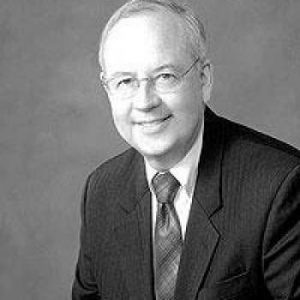 With Brett Kavanaugh poised to assume a seat on the Supreme Court, this is a good time to check in on his old boss, Ken Starr. Before Kavanaugh decided that Republican presidents should evade all scrutiny, Kavanaugh and Starr spent millions of taxpayer dollars trying to end a presidency over a blowjob. Truly one of the high points in the history of the Republic.
With Brett Kavanaugh poised to assume a seat on the Supreme Court, this is a good time to check in on his old boss, Ken Starr. Before Kavanaugh decided that Republican presidents should evade all scrutiny, Kavanaugh and Starr spent millions of taxpayer dollars trying to end a presidency over a blowjob. Truly one of the high points in the history of the Republic.
Well, Ken’s had a rough go of it since he was fired from his cushy gig as the president of Baylor University for ironically failing to investigate sexual misconduct taking place on his watch. Despite the mountain of evidence of failure compiled by Pepper Hamilton in creating its internal investigation and his own laughably insane defense of his conduct, people forget that the school actually tried to keep Ken Starr employed — by demoting him to law professor — before finally facing reality and severing all ties with Starr to salvage some measure of dignity.
Which makes this interview with Baylor’s former defensive coordinator and interim head coach Phil Bennett so absolutely fascinating. Bennett, who lost his job when Baylor blew up their entire football coaching staff over the allegations of the systematic enabling and cover-up of rape and other sexual misconduct by football players, provides a remarkable account of his take on the scandal.

How Legal Intelligence Is Bringing In A New Era Of Litigation For Plaintiff Firms
Darrow is building a new category of legal intelligence — one that helps firms understand complex legal landscapes earlier, more clearly, and with greater confidence.
Pepper Hamilton? Clueless racists. Head coach Art Briles? Well-meaning patsy. And Ken Starr? Well, he doesn’t like Ken Starr very much.
“If we had had (Title IX coordinator) Patty Crawford (who was hired in November ‘14) in place, this all would have been out of our hands and they would have handled it. Art would have survived. We all would have survived. I go back to Sam’s deal; the sensationalism and the lies that he played. He never played. He never set foot in the weight room or the locker room. I’ve said this from the get-go: This was a systematic problem. Baylor never wanted Title IX in the first place.”
High-ranking Baylor officials have said that Starr was fundamentally against Title IX because he felt it was not legal.
Bennett clearly feels, as pretty much everyone who thoroughly investigated this program does, that the school had an administrative level contempt for Title IX. Starr disagrees.
Reached by phone, Starr said, “That is patently and demonstrably untrue.”
By “patently and demonstrably untrue,” what Starr meant to say was “patently and demonstrably true.” But don’t take my word for it! For confirmation, we need look no further than… Ken Starr himself. In 2016, he went to Columbia Law School to give a talk on Title IX and told the assembled audience — including me — that he unequivocally did not believe Title IX gave schools any legal authority to address off-campus sexual violence. In his defense, he said he did support Title IX to the extent it funds Women’s Basketball, so I guess that’s what he means here when he suggests it’s untrue that he didn’t think Title IX was legal.
Somehow I don’t think that’s what’s meant in this context.
Bennett remains loyal to former head coach Art Briles, who he defends as a football coach who did everything by the book in a system that wanted to pass the buck on sexual violence and hoped they could pin everything on him if something ever went wrong. To that end, Bennett is adamant that once players were accused of misconduct, Briles suspended them to allow “due process” to run its course — a message Bennett says came from former athletic director Ian McCaw. For the record, McCaw is now gainfully employed as an athletic director at Liberty University. Bennett argues that responsibility for protecting students from sexual violence should never have been put on a football coach and… that’s not a terrible argument.
“Art had done right, and it started to affect him. He would say to me, ‘I could have done more.’ I would say, ‘What would you do different?’ He said, ‘I don’t know. Go to the police?’ We did not have Title IX until after all of this stuff.”
It probably should be on everyone to do more. There’s no justification to sit idly by in the face of criminal activity that endangers students. But it seems the height of irresponsibility for a school to rely on someone whose actual job description is drawing up zone running schemes to police gender violence.
But Bennett has some of his harshest words for Pepper Hamilton, whose investigation and report became the basis of Baylor’s decision to part ways with almost anyone even tangentially involved in this scandal. Bennett rips the firm as clueless about the basics of running a college football team — allegedly suggesting to him that the school’s lawyers should have gotten involved as soon as a student showed up late for practice — and prone to inserting some disturbing racial observations.
[Question:] Is it true one of the investigators asked a coach why the team has so many black players?
“It was me. We had been talking about (defensive end) Shawn Oakman. They asked about a situation. They thought we just got Shawn (who was a transfer from Penn State). I knew Shawn because I recruited him when I was at Pittsburgh. I knew his situation (before college in Philadelphia). It was tough. One of the investigators said her husband is a Philly cop and knows the area and I get up (for a break) and the woman says, ‘Y’all seem to have a lot of black players.’ I looked at her and said, ‘Are you kidding me?’
“She says, ‘I don’t mean …’ and that was the end of it. Later on it comes that how do your black players fit in on campus life at Baylor? As it went on, I asked one of them, ‘Do you realize you have not asked me about a single white player?’ It was too many questions (about race) and it was almost that I got the feeling you should have thought about bringing them in before you brought them here. I was not going to explain to them how or why we recruited.”
Bennett never comes right out and says it, but throughout his interview, he makes clear that he felt Pepper Hamilton’s questioning veered uncomfortably toward, “Well, you had black players, so you should have known they were potential criminals.” If this was unconscious bias, it’s a pretty good reason why law firms need to be honest with themselves about bias. If it was conscious bias… then that’s a whole other problem.
Obviously, Bennett has a point of view here. He and his friends all lost their jobs and his students — even those with no involvement in anything — were maligned. Still, this interview reads as a refreshingly frank account of a man who had a ground floor view of a massive scandal that’s mostly been discussed by the people at the top.
And it’s a sobering reminder of how badly the students at Baylor were failed by the institution.
Exclusive: Former Baylor defensive coordinator recounts the rape scandal [Star-Telegram]
Earlier: Irony Alert: Ken Starr Should Lose His Job For Not Investigating Real Sex Crimes
Ken Starr Fired — Can Still Teach ConLaw
Ken Starr’s Embarrassing ESPN Interview — How Can He Still Teach Law?
Ken Starr Fails Deposition 101
Ken Starr Completely Out At Baylor Law School
Ken Starr’s Defense Of His Baylor Tenure Is… Not Compelling
 Joe Patrice is an editor at Above the Law and co-host of Thinking Like A Lawyer. Feel free to email any tips, questions, or comments. Follow him on Twitter if you’re interested in law, politics, and a healthy dose of college sports news.
Joe Patrice is an editor at Above the Law and co-host of Thinking Like A Lawyer. Feel free to email any tips, questions, or comments. Follow him on Twitter if you’re interested in law, politics, and a healthy dose of college sports news.
